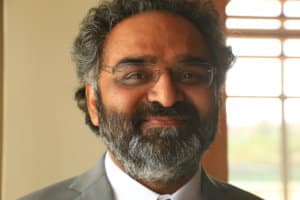The right teachers are invaluable. They make your learning experience whole. When it comes to graduate education, the University of Vermont (UVM) has a faculty with robust qualifications who are able to instil values and knowledge that inspire students to go forth and change the world.
Programmes here are no mere academic exercises — they are geared towards solving issues that are as current as they are real. People and the planet are in plight. From the depletion of fossil fuels, around two-thirds of the global biodiversity destroyed, increased extinction of many species, and more, humans have had a disturbing effect on earth and are set to suffer grave consequences from their own destruction.
Professor of public policy and computer science as well as director of the PhD in Sustainable Development Policy, Economics and Governance (SDPEG) PhD programme Asim Zia explains, “Since the first World Environment day in 1972, more than 50 years have passed and many resolutions about transitioning human development to a sustainable path have been passed at international and regional scales, yet the triple crises of biodiversity loss, climate change and global inequality continue to deepen. The UN initiatives in the form of Millennium Development Goals and currently Sustainable Development Goals have mostly failed to halt this trend.”
The ever growing pile of problems to be fixed are not limited to the environment, but also includes more social and societal ills. Much of UVM’s research works towards resolving these issues. For instance, participating in Medidata’s groundbreaking sensor cloud network could lead to better patient care. UVM’s Centre for Biomedical Innovation (CBI) is known as a centre for design, development, and testing of biomedical devices and systems with a focus on rural healthcare. Those with the potential to create advanced biomedical technologies, from train inventors to entrepreneurs and business leaders, are given support by this hub.

Source: UVM. Photo by Glenn Russell
Which programmes can help you change the world?
A fixture of the university for 15 years, Zia has extensive experience which can help inform students in unique ways. “In 1993, I started my professional career as a public servant in the civil superior services of the Government of Pakistan,” he says. “After serving for five years in the Economic Affairs Division, managing around US$500 million/year portfolio of bilateral and multilateral development assistance projects, I decided to pursue a PhD in public policy from the Georgia Institute of Technology. Having finished the PhD in 2004, I served for two years as post-doctoral scientist at the National Centre for Atmospheric Research (NCAR) in Boulder, Colorado; and then served a two-year stint as assistant professor of energy and environment at San José State University.”

Asim Zia. Source: UVM
Zia moved to UVM in 2008 as an Assistant Professor of Public Policy, primarily affiliated with a Master of Public Administration (MPA) programme in the Department of Community Development and Applied Economics. Today, he focuses on guiding students through an innovative PhD set to “train the future leaders of the 21st century who can bring about grassroots level transformative change in the vision and practice of socio-environmental development.”
“The SDPEG programme provides transdisciplinary, convergent training to the students to develop integrative, community-based solutions to address such urgent crises,” he says.
For the 2023-24 cohort, the university has received more than 400 expressions of interest. Most are international students, many of whom work on impactful projects. “More than 50% of the students are working on competitively won federal and international grant projects with SDPEG faculty ranging from responsible innovation in precision agriculture and artificial intelligence to biosecurity and sustainable food systems, renewable energy and climate mitigation, tropical forest conservation, poverty alleviation, sustainable production and consumption, smart sustainable cities, ecological monetary theory, decolonisation and global governance,” says Zia.
Just as profound in effect is the PhD in Social, Emotional, and Behavioral Health and Inclusive Education (SHIE). This is an area in which students will be fulfilling a critical need, according to the American Association for Employment in Education. Last year, the US Department of Education awarded US$1.25 million in funding through its Office of Special Education Programmes to the department for a project that will fully fund five doctoral students in the PhD in SHIE programme over the next five years.

Matthew Poynter. Source: UVM
The Cellular, Molecular and Biomedical Sciences (CMB) doctoral programme gives students the chance to choose from many advanced elective courses. “The CMB programme attracts applicants from diverse undergraduate majors, and we seek to admit students with science coursework appropriate to the major (recently admitted student majors include Biochemistry, Biology, Biotechnology, Cell Biology, Chemistry, Genetics, Microbiology, Molecular Biology, Physics, etc.) and indicating preparation for the CMB doctorate,” says Matthew Poynter, PhD Director of the CMB doctoral programme.
“The CMB PhD programme trains students to become scholars in their field, conduct hypothesis-based research in an ethically responsible manner, think independently, creatively, and critically, and effectively communicate as teachers, researchers, and scholars,” he says. Recent graduates of the CMB programme who received their PhD between 2014 to 2022 are a testament to the versatility of this skill set. They are now postdoctoral fellows at the likes of AstraZeneca and the National Institute of Allergy and Infectious Diseases, scientists at pharmaceutical companies, Chief Science Officers, and academics at prestigious universities, including UVM.
To kickstart your graduate school journey at the University of Vermont, click here to apply now.
Follow the University of Vermont on Facebook, Twitter, LinkedIn, Instagram and Youtube











